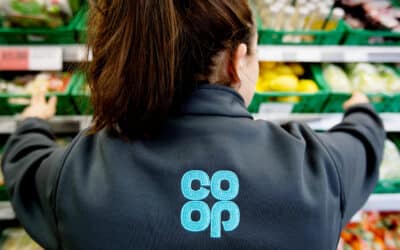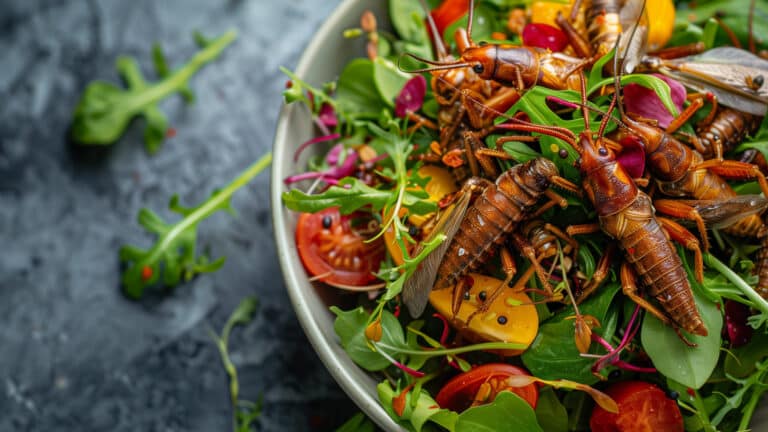Co-op has been using AI technology to predict what we’ll be eating by 2054.
It released the images to mark the publication of its Responsible Retailing Report, which explores the nation’s changing views on food ethics and sustainability over the last 30 years.
Engaging experts from FixOurFood and the University of York, it found that cricket salads, lab-grown steaks and azolla burgers could be on our menus in the next 30 years.
“The last 30 years we have seen scientific leaps into more sustainable produce which were unimaginable to most back in 1994,” said Bob Doherty, Director of FixOurFood and Dean of the School for Business and Society at the University of York.
“From lab-grown meat to vertical farming, the future of food is set to revolutionise how we eat. By 2054, British people will have edible insects on their dinner plate, and we may see the crushing up of crickets quicker than wholegrains. As climate change continues to impact our planet, we’ll also see a shift towards locally grown produce, with avocados grown in Surrey becoming a reality. We may even see the introduction of 3D-printed food. As we navigate the challenges of climate change, we’ll need to embrace these innovations to ensure that we can feed a growing population sustainably.”
The report suggests that in the next 3 decades, farmers and producers will become more valued in society, there’ll also be a rise in urban indoor farming, which will mean more lab-grown meat and seafood. They expected this meat, cultivated from animal tissues, to produce steaks, burgers, tuna and lobster will become mainstream.
Insect proteins including locusts, grasshoppers and crickets could become part of our daily diets, either as snacks or as the protein element of a main meal.
People are going to have more time to make their food, as the report believes that a 4 day week will be introduced within the next 30 years.
It comes as the Co-op publishes its Responsible Retailing Report – the report first began in 1994 and was the first-of-its-kind study into food industry ethics. Almost 700,000 people over the last 30 years have been polled as part of this report series, which looks at consumer views on transparency in food production and its impact on people, animals and the environment.
The figures reveal that 72% of consumers have become increasingly more concerned about ethical and sustainable food than in recent years – a sharp increase since 1994. The impact of climate change, animal welfare, plastic pollution and fair wages for global workers were amongst the top reasons driving this increased concern.
54% said they would be more willing to pay more for ethical and sustainable products – down from 62% in 1994. For younger shoppers aged 18–34-year-old this does increase to 60%, whilst older shoppers (55+) say they favour quality and buying British.
Clear and honest labelling was called out in 1994 as one of the biggest concerns for consumers at the time – a lot has changed across the industry, and now 47% said it’s easy to make sustainable choices based on product labels.
“As a food industry we’ve made a lot of progress, but rightly shoppers are calling on us to do more, with honesty and integrity at the core of our decision making. At Co-op, we remain committed to providing our members and customers with responsibly sourced and innovative food options, and we’re proud to champion home-grown produce and source only 100% British fresh meat, poultry and dairy,” stated Cathryn Higgs, Head of Ethics, Sustainability and Policy at Co-op.
“We also have an ambitious climate plan to reduce absolute emissions from our value chain by 48%, and own operations by 66% by 2030*, and as part of this we continue to ensure all our packaging is easy to recycle at home or through film collection points in selected Co-op stores.”











